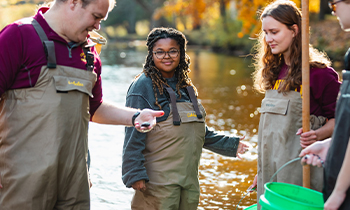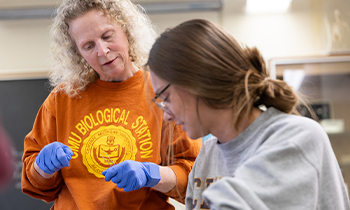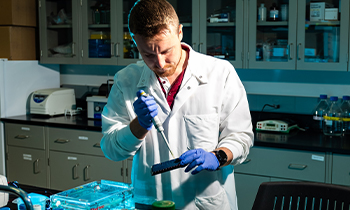What can you do with a biology major?
A lot more than you’ve been told.
 You take biology because it fits your schedule. But somewhere along the way, something shifts. You stop thinking of biology as a subject to pass and start noticing how things connect. And that’s when a different kind of question shows up:
You take biology because it fits your schedule. But somewhere along the way, something shifts. You stop thinking of biology as a subject to pass and start noticing how things connect. And that’s when a different kind of question shows up:
- Could this actually go somewhere?
- What can you do with a biology major, really?
People will offer easy answers. Med school. Research. Maybe grad school if you’re lucky. But biology doesn’t deal in easy answers. It trains you to look closer and to see what others miss.
Find out what you can actually do with a biology degree, which careers are real options, and how students at Central Michigan University are already making it happen—in labs, in the field and everywhere in between.
Whether you're just getting started or narrowing your focus, our biology advisors can guide you through your academic and career decisions. Start shaping your future now.
Is biology a major with only one path?
You don’t major in biology to follow someone else’s path, but to build your own.
You learn how to design an experiment, break down messy data and spot patterns in systems that don’t want to give up their secrets. You get comfortable with uncertainty. You get curious on purpose.
This toolkit travels with you. It works in hospitals, sure, but also in clean energy labs, agriculture startups, classrooms, courtrooms and field stations in the middle of nowhere. The world is full of living problems that need solving. Biology majors tend to be the ones asking better questions.
What can you actually do with a biology major?
 Here’s the honest answer: you can specialize, pivot or expand.
Here’s the honest answer: you can specialize, pivot or expand.
Chloe didn’t wait for a lab to find her—she found one herself. Her interest in genetics led her to research projects that earned her a Goldwater Scholarship, one of the most competitive awards in the country for STEM students.
Jake studied fish behavior—specifically, why some species eat their own young. His research on filial cannibalism in cichlids landed him coverage in National Geographic and Smithsonian. That started in a CMU lab.
Faculty are right in the middle of it, too. In one recent study, CMU professor Janelle Apple explored how social stress shapes brain health.
These are just a few examples but they make a point. Biology degree jobs don’t come from checking boxes. They come from curiosity, pattern recognition and the ability to ask sharper questions.
You might start in a clinical lab, tracking antibiotic resistance. Maybe you’re deep in the woods with a field notebook, monitoring species on the brink. Or maybe you’re breaking down CRISPR for high schoolers who never thought they liked science. It doesn't have to look one way.
It’s about learning to think like a scientist and using that lens to explore the real-world impact of biology degree jobs.
Is biology a good major for earning potential?
A biology major can lead to high-paying jobs—especially when paired with experience in lab work, data analysis or industry certifications. Fields like biotech, healthcare analytics, pharmaceuticals and environmental consulting offer serious income potential, even without years of post-grad education.
Entry-level lab technicians and research assistants often start with competitive salaries, and the ceiling rises quickly with a master’s or even a few years on the job. The skills are transferable. The demand is growing.
The key is showing how your skills translate. Biology teaches more than terminology. It trains you to manage complexity, communicate clearly and work with both precision and perspective—skills hiring managers notice when you learn to speak their language.
Do you have to go to med school?
This one’s worth repeating.
Pre-med is one way forward. But it’s not the only direction a biology degree can take you. And you shouldn’t feel like you have to explain yourself if that’s not where you’re headed.
Biology prepares you for more than one job title. It gives you a framework to explore a world of living systems. You can use it to explore disease, climate, food systems, animal behavior, forensic evidence, population health—or all of the above.
It’s one of the few degrees that trains you to stay curious about every part of being alive. From ecosystems to human health to future technologies—we’re still just scratching the surface.
How does biology prepare you for real life?
One minute you’re measuring soil health on a farm. The next, you’re presenting data to a city council. You might spend the morning interpreting charts and the afternoon tracking wildlife in a field notebook.
It’s not a lack of focus—it’s adaptability. It’s how the real world works.
If you want a degree that only leads to one job, biology might not be it. But if you're after something that sharpens your thinking, opens doors and keeps pace with a changing world, this one’s worth your time.
Still wondering what you can do with a biology major—or what kinds of biology degree jobs are out there?
You could:
 Run lab trials for a cancer research center.
Run lab trials for a cancer research center.- Create sustainability plans for a Fortune 500 company.
- Study how climate change affects pollinators.
- Work in a DNA testing lab.
- Manage patient data for a public health initiative.
- Design science curriculum for middle school classrooms.
- Analyze soil conditions for a regenerative farm.
- Assist in criminal investigations as a forensic biologist.
- Join a startup tackling antibiotic resistance.
- Research how urbanization impacts biodiversity.
- Write for a science magazine or nonprofit newsroom.
- Lead environmental education workshops for kids.
These aren’t hypotheticals—they’re real jobs, built from real decisions. And they started with a biology degree—not because it handed anyone all the answers, but because it taught them how to ask better ones.
So what now?
Biology won’t lay out every step. But it gives you the tools to navigate whatever comes next.
If you're looking for a degree that gives you flexibility, depth and a real connection to the world around you, this is it. And if you're still figuring things out? Good. That’s where science begins.
Start with the questions that won’t leave you alone. Find a program with hands-on lab work, good mentorship and opportunities to specialize—whether that’s biotech, field ecology or something in between.
Here at Central Michigan University, our biology programs help you turn curiosity into impact. With access to real research, expert faculty and concentrations like microscopy or biomedical sciences, you’ll build the skills to do meaningful work—wherever life takes you.
Study life. Then go do something real with it.